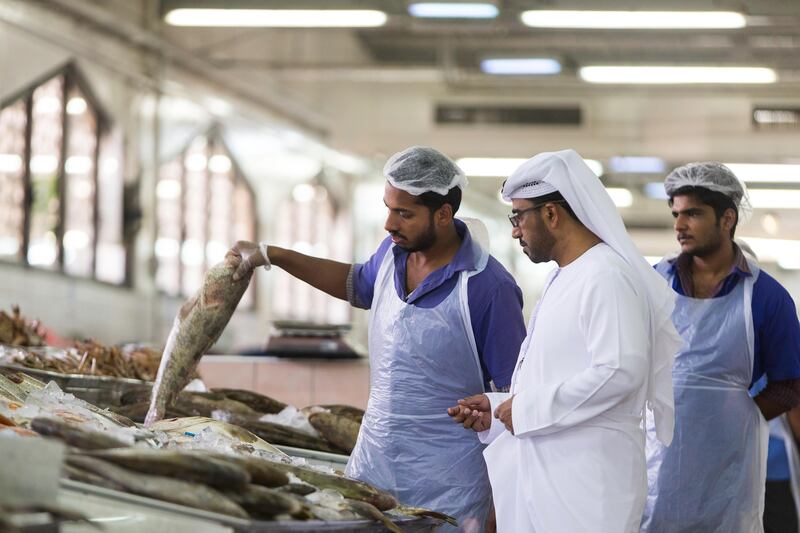Abu Waleed looks at the four small fish on the weighing scales and sighs. “No others?”
His dinner choices are limited at this time of year. Fish prices have increased 50 to 75 per cent this month and the most delicious and popular species are scarce. His fishmonger wants Dh10 for 520 grams of palm-sized jash but when Abu Waleed sees that two of them are missing pieces, he puts them back.
“Usually hamour is on almost every stand,” says the 60-year-old, an Abu Dhabi fish market regular from Palestine who declined to give his last name.
Inflated prices and limited selection are typical in summer and fishmongers caution that fresh, local fish in summer will become increasingly rare as fish populations decline.
“The number of fish has dropped and dropped,” said Mostafa Hebsa, 48, a fishmonger from Kerala, India.
Nets are not heavy now like they were when he started work at the market in the late 1990s. Fish stocks declined by 80 per cent from 1978 to 2011, according to the Emirates Wildlife Society in association with the World Wildlife Fund (EWS-WWF).
In winter, there is still enough fish to feed everyone but in summer, the decline in fish becomes more noticeable, said Mr Hebsa. “There are no fish in Abu Dhabi. Well, just a few. It’s too hot and it will be like this for another three months. They go far, far away. When the cold comes, they return.”
Read more:Families prone to moving between countries choose international Baccalaureate
Fishermen and fishmongers have already felt the strain. Small catches mean there is little financial incentive to make long trips to cool waters. Only about a quarter of Abu Dhabi fishmongers offer hamour. Kingfish and barracuda are in short supply. Many of the fish on offer are much smaller than usual, like the 800-gram tuna being sold at one of the market stands.
Hamour is currently priced at Dh60 a kilo, double its winter price. Shari was priced at Dh35 per kilo, a 75 per cent price increase. Varieties of smaller fish normally offered for Dh15 are selling for Dh25.
Fishmongers have compensated with imports from the Northern Emirates and, increasingly, from abroad, though the high cost of refrigerated transport is a barrier. Fish stocks on the east coast have been heavily depleted, declining by two thirds between 2002 and 2011, according to the Ministry of Environment and Water.
“Before we were thousands and now we are millions in this country,” said Abdulrahman Abdullah, 65, a fish market customer from Abu Dhabi. “The population is higher and people need to eat.”
There have been a number of initiatives to reverse the depletion of fish stocks, including limiting fishing licences, seasonal bans and modified gargour fishing traps.
Habitat preservation could play a vital role in restoring the fish market’s local catch. In 2015, the Environment Agency - Abu Dhabi announced plans to increase protected marine areas in the emirate to 14 per cent by 2019 to enhance biodiversity and revive fish stocks.
Many of the current protected marine areas in Abu Dhabi are near the shore and vulnerable to human activities, like dredging. An estimated three quarters of coral reefs in the Gulf have been lost and scientists have warned that coral reefs - vital to fish population - could disappear entirely within our lifetime. Mangroves and seagrass beds are also at risk.
As habitats disappear, the Abu Dhabi staple of fresh, local fish available year-round could become a thing of the past.
Customers are reluctant to change their habits. Summer shoppers at the Abu Dhabi fish market say that economics, not environment, dictates what they will, and won’t, put on their dinner plate.
“As an educated man, yes, I would change what I eat but if my family asks me to buy something then I’ll do my best for them,” said Abu Waleed.
An estimated 60 per cent of all catch was from overfished species such as hamour and kingfish, according to a 2011 EWS-WWF report. Despite awareness campaigns about its dwindling numbers, hamour remains a restaurant favourite.
“The number of fish are decreasing and it’s not like before,” said Nasser Rashed Al Hulaify Al Zaabi, deputy general manager of Abu Dhabi fishermen Co-operative Society. “Twenty years ago there were many fish. The new generation has an understanding of this but the most important thing is the law. If the fish is there, people will buy it.”
In Abu Dhabi’s kitchens, the fish machboos keeps coming.






